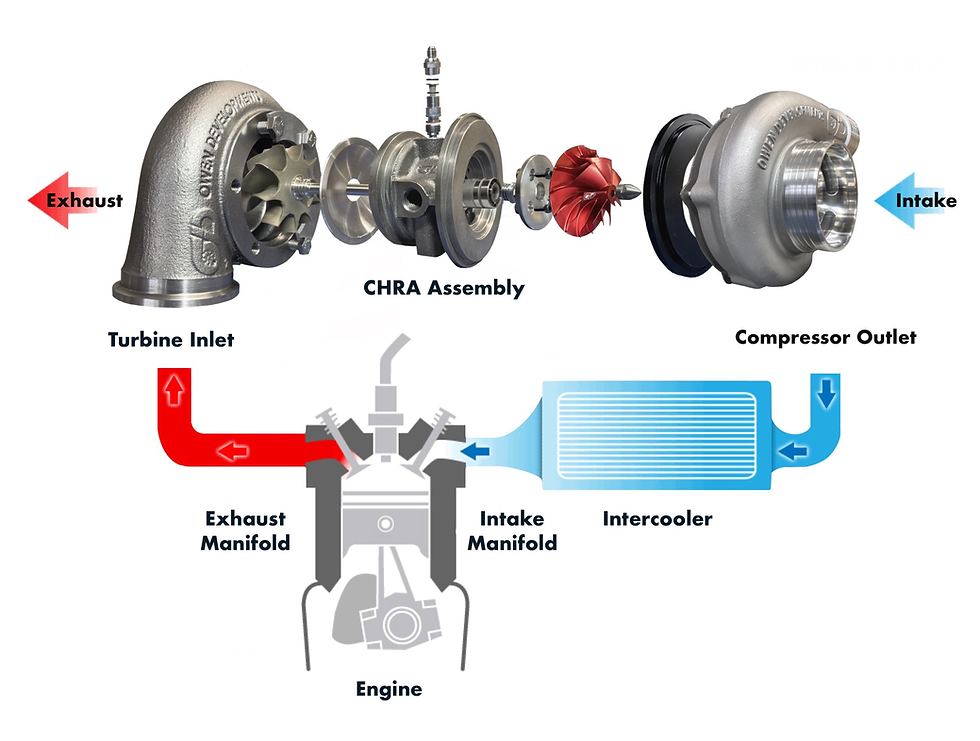Turbocharger Care: Common Issues and Preventive Measures
- Quality Auto & Body

- 10 abr 2024
- 2 Min. de lectura
A turbocharger is a critical component in modern vehicles, providing increased power and efficiency by compressing air into the engine. However, like any mechanical part, turbochargers are prone to wear and tear over time. In this comprehensive guide, we'll delve into the common issues associated with turbochargers, as well as proactive steps you can take to prevent potential problems.
Introduction: The turbocharger plays a vital role in enhancing the performance of vehicles equipped with turbocharged engines. By compressing air and forcing it into the engine cylinders, turbochargers significantly increase engine power output. However, the complex nature of turbocharger systems means they require regular maintenance and careful attention to avoid costly repairs.

Common Turbocharger Issues:
Turbo Lag: One common complaint among turbocharged car owners is turbo lag, a delay in throttle response when accelerating. This phenomenon occurs when there's a delay in the turbocharger's spool-up time, resulting in a noticeable pause before power delivery.
Oil Leaks: Turbochargers rely on a constant supply of oil for lubrication and cooling. Over time, seals and gaskets within the turbocharger can degrade, leading to oil leaks. These leaks not only reduce lubrication but can also pose a fire hazard if oil comes into contact with hot engine components.
Boost Pressure Problems: Turbochargers operate by compressing air and forcing it into the engine at higher pressures than atmospheric conditions. Any disruption in boost pressure, such as a leak in the intake system or a faulty wastegate, can lead to decreased engine performance and potential damage to the turbocharger.
Wastegate Issues: The wastegate is a crucial component of the turbocharger system, regulating boost pressure by controlling the flow of exhaust gases to the turbine. Malfunctions in the wastegate can result in overboost or underboost conditions, compromising engine performance and reliability.
Turbocharger Shaft Play: Excessive shaft play in the turbocharger's rotating assembly can indicate worn bearings or damaged internal components. If left unchecked, excessive shaft play can lead to turbocharger failure and the potential for severe engine damage.
Preventive Maintenance Tips:
Regular Oil Changes: Maintaining a clean and properly lubricated turbocharger is essential for its longevity. Be sure to follow the manufacturer's recommended oil change intervals and use high-quality synthetic oil to minimize wear and prevent oil-related issues.
Inspect and Replace Filters: Dirty air and oil filters can restrict airflow and impede lubrication, putting unnecessary strain on the turbocharger. Regularly inspect and replace air and oil filters according to the manufacturer's recommendations.
Monitor Boost Levels: Keep an eye on boost pressure levels using a boost gauge or onboard diagnostics system. Sudden fluctuations in boost pressure can indicate underlying issues with the turbocharger or related components.
Address Oil Leaks Promptly: If you notice any signs of oil leakage around the turbocharger or engine, address them immediately to prevent further damage. Replace worn seals and gaskets as needed and ensure proper installation to prevent future leaks.
Avoid Excessive Heat: Turbochargers operate at high temperatures, making them susceptible to heat-related damage. To minimize thermal stress, allow the engine to cool down after hard driving and avoid prolonged periods of idling.
Conclusion: Proper care and maintenance are crucial for ensuring the longevity and performance of turbocharged vehicles. By understanding the common issues associated with turbochargers and implementing preventive measures, car owners can enjoy the benefits of turbocharged engines without the headache of unexpected repairs.










Comentarios